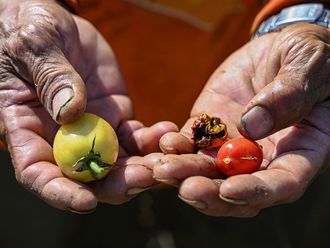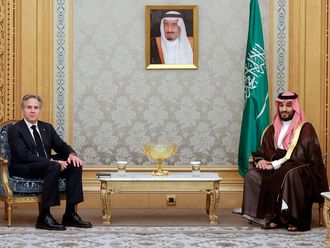Manila:
President Benigno Aquino signed a 2.6 trillion peso (Dh217.166 billion) budget for 2015, with the education department getting largest share, followed by the department of public works and highways which is in charge of infrastructure development; and the department of defence.
“We sped up the budget process, we lessened the need for special allotment release order [SARO] and signatures [needed for release of funds]. This budget is a true budget of the people,” said Aquino who averted criticisms that the 2015 budget still allows secret allocations which are sources of political patronage that could favour the ruling party in the 2016 elections.
The education department was allotted P367.1 billion (Dh30.59 billion); public works and highways department, P303.2 billion; defence department, P144 billion; interior and local government department P141.4 billion; and health department, P108.2 billion, Budget Secretary Florencio Abad said, adding the entire 2015 budget is 15 per cent higher than the 2014 budget.
The Social Welfare Department was allotted P103.9 billion (Dh 8.65 billion): agriculture department, P89.1 billion; transportation and communications department, P59.5 billion; environment department, P21.5 billion; science and technology department, P17.8 billion, Abad said.
The two houses of Congress also approved a P10 billion supplemental budget that was not included in the 2014 budget, for the rehabilitation of areas destroyed by Typhoon Haiyan in central Philippines in November 2013, said Abad.
The 2015 budget has also allocated a total of P42.4 billion for calamity fund, that will go to the National Disaster Risk Reduction and Management Council (NDRRMC), an agency under the defence department, which is mobilised when typhoons, volcanic eruptions, and earthquakes occur, Abad explained.
Part of the education department’s budget will go to the construction of 31,728 classrooms and repair of 9,500 damaged classrooms; purchase of 1.3 million seats for students; and development of 13,586 water sanitation facilities for public schools.
Part of the budget of the public works and highways department will go to the building of roads and bridges, in the amount of P185.8 billion and the railway systems, P10.6 billion.
Part of the health department’s budget is a P37.1 billion subsidy for 154 million poor people under the government’s Philhealth programme.
Part of the social and welfare department’s budget is a P35.3 billion subsidy for 4.3 million poor families, said Aquino. The government’s conditional cash transfer for poor people programme is funded by a special loan from the World Bank. The government’s flagship anti-poverty programme began during the time of former president Gloria Arroyo.
P11 billion was allocated for socialised housing for poor people who are living in danger and high-risk zones that are often affected by about 21 typhoons that visit the Philippines every year.
Meanwhile, Senator Miriam Defensor Santiago estimated that the 2015 budget has P37.3 billion excess or alleged pork barrel funds. “There will be savings or money that will not be spent by line agencies and funds will eventually revert to the coffers of the executive department, the spending of which will be determined by the president prior to the 2016 polls,” claimed Santiago. Budget Secretary Abad denied the allegation.
Earlier, the Supreme Court ruled that the Disbursement Acceleration Programme (DAP) that Aquino created with a presidential order in 2012, funded by savings of various line agencies, and spent by the president’s discretion, was unconstitutional.
The Supreme Court also stopped the P200 million and P75 million yearly allotments per senator and congressman, respectively, following reports that funds were massively misused.
Last year, whistle-blowers revealed that senators and congressmen pocketed more than half of their respective development funds that were approved for release to bogus projects and non-functioning non-government organisations (NGO).












